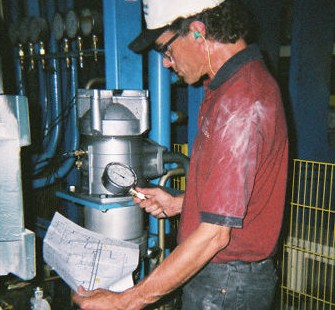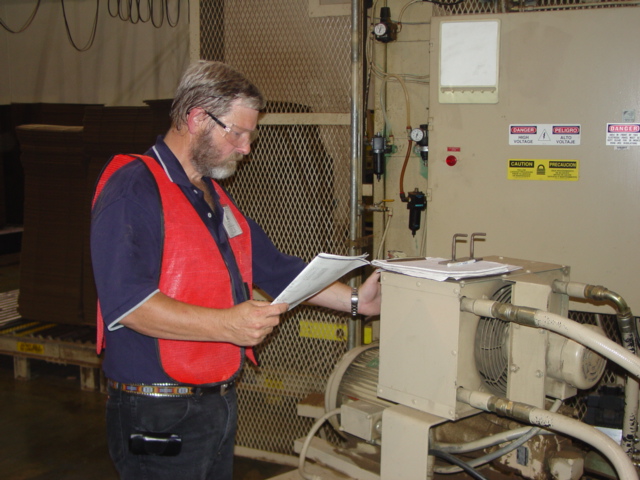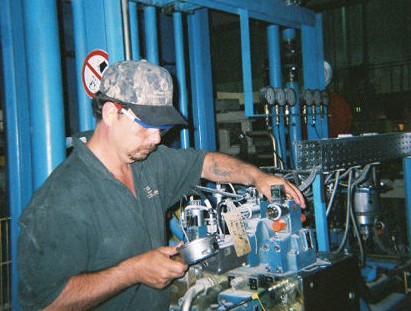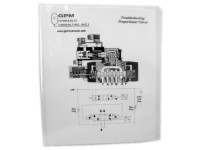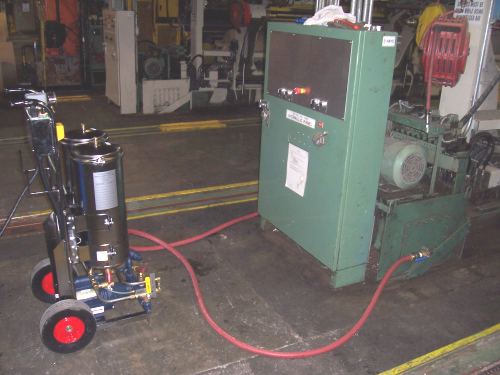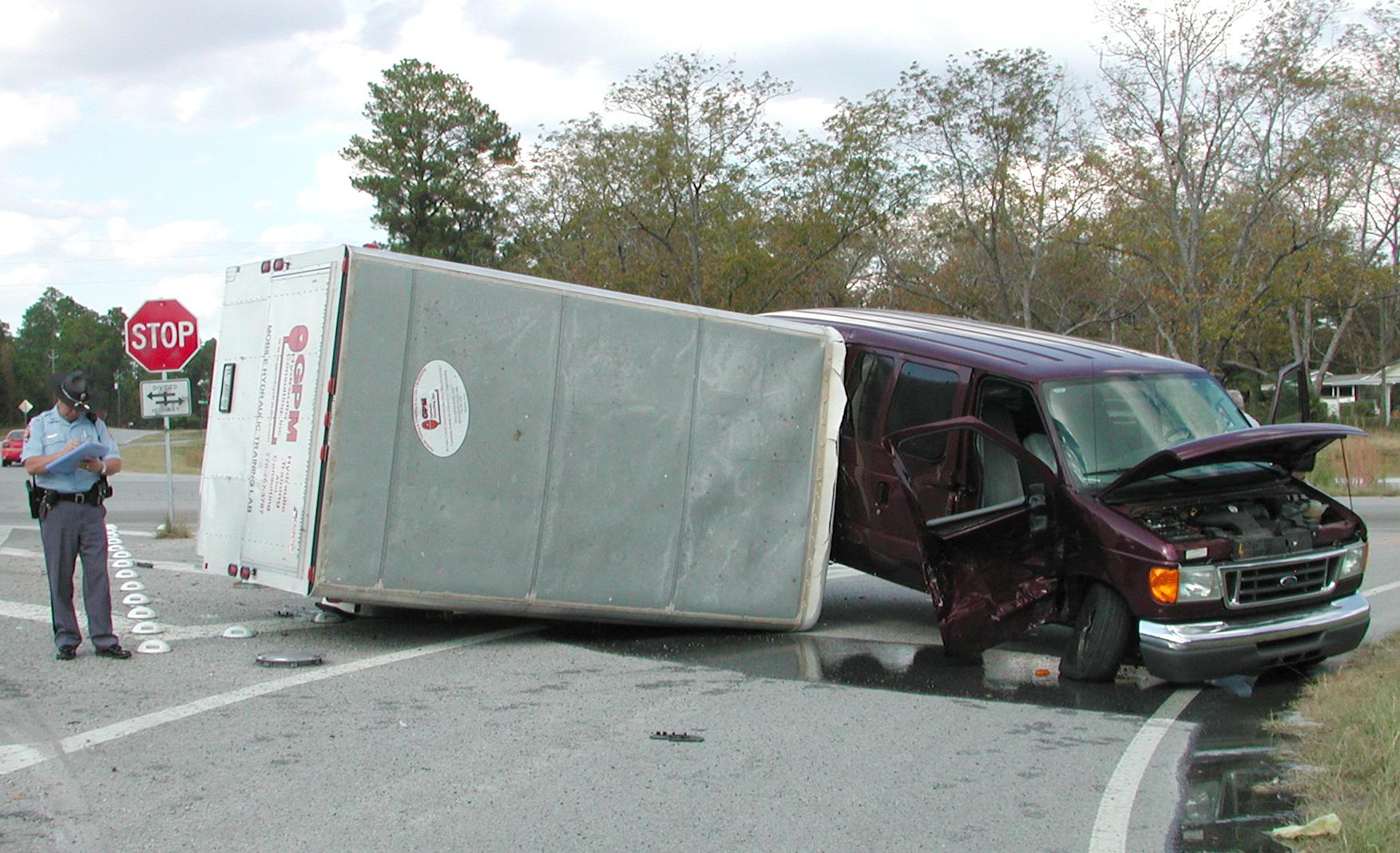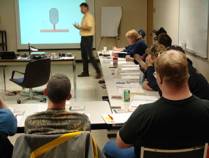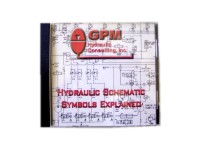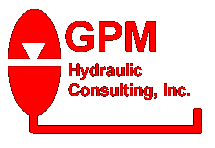
P.O. Box 1376 Monroe, GA 30656 (770) 267-3787 gpm@gpmhydraulic.com
|
December
2008
For an archive of past newsletters, please visit: |
||||||||||||||||||||||||||||||||||||||||||||||||
|
CLICK HERE to send this newsletter to a friend! |
|||||||||||||||||||||||||||||||||||||||||||||||||
|
|||||||||||||||||||||||||||||||||||||||||||||||||
|
|
|||||||||||||||||||||||||||||||||||||||||||||||||
|
|
Maintenance Hydraulic Troubleshooting on Interactive CD Our nationally acclaimed
Maintenance Hydraulic Troubleshooting workshop
on six fully interactive CD's. Includes our MHT workshop manual.
6-CD Set - $1200 Individual CD's - $250
+ Shipping and Handling.
Click on http://gpmhydraulic.com/mhtcds.htm
to find out more.
|
||||||||||||||||||||||||||||||||||||||||||||||||
| 1. The Machine Still Works - Shouldn't I Just Leave It Alone? | |||||||||||||||||||||||||||||||||||||||||||||||||
 Jack
Weeks - Consultant for GPM Hydraulic Consulting, Inc Jack
Weeks - Consultant for GPM Hydraulic Consulting, Inc |
|||||||||||||||||||||||||||||||||||||||||||||||||
|
There is a lot to be said for reactive maintenance.
"If it ain't broke, don't fix it!" is a common refrain in mills
around the country. I teach a rare hydraulics class in which the
students do not tell me that their supervisors will not allow them to take
the time for many of the preventive maintenance techniques we teach.
Naturally, as hydraulic consultants, we teach a more proactive regimen of
maintenance than we usually find in the facilities we visit.
It's not that we don't understand the demands of real world industrial settings. We understand them all too well. Our livelihood depends upon it. We know that much of a maintenance professional's time is spent putting out fires. That preventive maintenance must necessarily be sacrificed at times in favor of continuing production. But we also know that a machine behaving strangely is a machine that will soon metamorphose from an asset to a liability. The trick is to know when to just leave it alone and when to intervene. There are a few times when not taking action will almost definitely result in machine failure. Moving Too Slowly When a machine moves more slowly than it used to, it's not just tired. Hydraulic machines don't go out carousing at night - if it's slowing down, there's something wrong. A reduction in speed means a reduction in flow. Either the pump isn't delivering as much flow as it used to or the flow it delivers isn't getting to the actuator. Think about how a hydraulic component - any hydraulic component - fails. It leaks. Either it leaks onto the floor, in which case the problem is obvious, or it leaks internally, a condition called "bypassing". Find the bypassing component and you will find your speed problem. Ignore it and you will find yourself with some lost production time. If it's the pump that is bypassing, it will have to be replaced. But don't replace it right away just to "see if that will fix it". There are some quick ways to check the pump to determine its condition. The easiest way to check a fixed displacement pump is to measure the current draw of the electric drive motor. A worn pump is easier to turn than a brand new one. So the current draw will be reduced when the pump is bad. This of course presupposes you know its normal current draw. If you don't, you will have to measure the flow both at idle and under load. A significant difference in flow indicates a worn pump. A variable displacement pump will have a case drain that will keep pressure from building against the shaft seal. Internally bypassed oil returns to tank through the drain instead of building case pressure. If a variable displacement pump has excessive case flow, it is worn and must be replaced. Again, that presupposes you know the normal case flow of that particular pump. Are you seeing a thread here? A monthly preventive maintenance checklist can tell you at a glance how your pump is doing. How long would it really have taken to make benchmark checks of current draw and case flow at times when you knew the pump was good? The pump is not the only thing that can bypass and slow your machine down. Almost all of your components can bypass. When they do, there will be a pressure drop. As we teach in our classes, any pressure drop that doesn't result in mechanical work that makes money will generate heat. An abnormal temperature gain across any component indicates bypassing. And yes, there's no way to know what is abnormal unless you already knew what was normal. It behooves us to be familiar with our machines and an infrared temperature gun can be invaluable in learning normal temperature gains and spotting abnormal ones. Making Strange Noises Unusual sounds coming from a hydraulic machine shout imminent failure. If your car started making a funny noise, you would check it out or have it checked immediately, wouldn't you? So why do we allow our multimillion dollar hydraulic machines to cry out for help as long as they are still producing? Production will halt before long if certain sounds are not addressed. Aeration and cavitation are common harbingers of machine failure. Most people don't know the difference between the two and most will just let them continue until the pump fails and has to be replaced. But if they are caught early, pump failure can be avoided. Cavitation is a steady high pitched whining sound. Aeration is much more erratic and is usually accompanied by a sound similar to gravel rattling around inside the pump. Both will destroy the pump if they are not corrected right away. Cavitation occurs when the pump attempts to deliver more oil than it can get into it. The most common cause is a plugged suction strainer or filter. Suction strainers are below the level of the oil, out of sight and out of mind. If cavitation is heard, check the strainer. Second most common is low oil temperature. Never start the machine with oil colder than 40 degrees Fahrenheit. Never put it under load until the temperature is at least 70 degrees. Pump output is directly proportional to drive motor speed. If the drive motor is replaced with one that exceeds the pump specifications, it will cavitate and destroy itself rapidly. Aeration results from outside air entering the pump suction. A leak in the suction line, a worn shaft seal or misaligned couplings can all cause a pump to aerate. Remember that the pressure in the pump suction is below that of atmospheric pressure, so oil won't leak out - air will leak in. Low fluid level can result in air being drawn into the pump along with the oil, so check your fluid level too. Overheating This is perhaps the most common problem that is ignored in the hope that it will simply go away once winter gets here. In our experience, excessive heat is the second most common cause of hydraulic failures, the first being contaminated oil. As long as the machine is still making money, most people will allow a heat problem to continue. But if left unchecked, an overheating machine will always result in downtime. Mineral oil begins to chemically break down at 140 degrees Fahrenheit. Varnish deposits develop and cause valves to stick. Viscosity drops and the lubricating properties of the oil begin to diminish. Every component in the machine suffers as a result. We are usually amazed that most people deal with a heat problem by adding a heat exchanger or increasing the size of the one already in place. This doesn't deal with the problem, it only masks the symptom. When a machine is overheating, it is working harder than it has to. So we waste money by allowing the machine to overheat and then waste some more to cool it back down. Remember, if the machine was operating fine two weeks ago and now it's overheating, the problem is not a design issue. Something is wrong and it needs to be addressed. Increasing the capacity of the heat exchanger (or laying bags of ice on the machine or soaking it down with the fire hose or opening the doors in the winter or... all of these are measures we have seen taken!) is not the answer. Find the source of the excess heat and correct it. There are literally hundreds of possible heat sources in most hydraulic machines, but a few are most common. Incorrect pressure settings cause a lot of heat problems. If a pump compensator is set above the relief valve, temperatures will soar. In the absence of designer recommendations, we recommend the relief valve be set 250 PSI above the compensator. If the relief valve is dumping, it always needs to be investigated. Remember that relief valves dump only when something is wrong! Pressures are usually set higher than they should be. This is a particular problem with servo and proportional valve systems. Servo and proportional valves are notorious heat generators. This is because they are seldom if ever all the way open. There is always a pressure drop across them. Whenever there is a pressure drop and no useful work done as a result, there will be heat. The higher the pressure in the system, the greater the pressure drop across the valves and the more heat is generated. Even if all of your pressures are set correctly, the machine can overheat if it has a heat exchanger that is not properly cared for or located. Air heat exchangers, similar to the radiator in a car, need to be located near a cool air source. Most machines that we see have the heat exchanger mounted in one of the worst possible places - right above the reservoir. All of the heat radiated by the reservoir goes straight to the heat exchanger making its job nearly impossible. The reason most heat exchangers are mounted above the reservoir is because this is how the hydraulic unit was delivered. This doesn't mean it needs to stay there. It can be moved to any convenient, cooler location. Mounted in an exterior wall so it can dissipate heat outdoors is often a good answer. The fins also need to stay clean - you should always be able to see daylight through them. And if they become bent, they must be straightened with a metal comb. Water heat exchangers transfer heat in the oil to water flowing through copper tubing. Typically they are more efficient than air heat exchangers, but the water flow is critical to the heat transfer. In general, the water flow must be about 1/4 - 1/3 that of the oil flow. Too little water flow and the water becomes saturated with heat. Too much and it doesn't spend enough time in the cooler to do its job. Adjust for the maximum temperature gain across the inlet and outlet water lines. Sludge in the reservoir absorbs heat and makes it difficult for the reservoir to dissipate it. Drain and clean the reservoir at least once a year - more often in high dust environments. Under no circumstances should the temperature shutdown switch ever be bypassed. We have seen this done on many occasions, always with disastrous results. The shutdown switch is the only heat protection the machine has. As long as there is a danger of the machine shutting down, everyone will do everything they can think of to keep temperature down. Once a jumper has been placed across the temperature switch, all heat problems will be ignored. Every time we have seen this done - every time, temperatures have soared and the resulting damage has cost huge amounts of money and extended outages. Maintenance is the largest controllable expense in most industrial plants. For many, the cost of maintenance exceeds annual net profits. Surprisingly, in an economic time when one would think cost saving measures would be at their peak, maintenance costs are rising instead of dropping. If ever there was a time to abandon our old school reactive methods and adopt proactive maintenance policies, it is now. At GPM, proactive maintenance is nothing new. This is our fifteenth year of helping people slash their hydraulic maintenance costs through effective training and consulting. If you are ready to begin developing a proactive line of defense, call us today and we can help. |
|||||||||||||||||||||||||||||||||||||||||||||||||
| Jack Weeks entered GPM’s organization in January of 1997 as a CAD draftsman and hydraulic instructor. He has trained thousands of electricians and mechanics in Hydraulic Troubleshooting methods. His computerized animations have made GPM's presentations and training CD's the recognized leader in the industry. He received his education from the Georgia Institute of Technology School of Electrical Engineering and the Department of State Foreign Service Institute. Jack is an experienced draftsman and taught telecommunications equipment operation and repair for the Central Intelligence Agency at American embassies overseas. | |||||||||||||||||||||||||||||||||||||||||||||||||
|
2. In-plant consulting and troubleshooting
Nothing is more expensive than unscheduled down time. GPM’s customers know they can call whenever they have a troubleshooting issue they simply can’t resolve. With over 50 years experience dealing with hydraulic failures, our consultants have the resources to help troubleshoot whatever hydraulic problem you encounter. Whether you’re experiencing a total system outage, repeated component failure or just need a professionally designed preventive maintenance schedule, the consultants at GPM can help. Call GPM for In-plant Troubleshooting Leakage Problems Pressure Settings Shock Problems Preventive
Maintenance Scheduling Hydraulic Troubleshooting Manual Development Startup
Consulting and Recommendations Heat
Problems Repeated
Component Failures Speed Problems Do you want to learn more on how GPM can help you? Go to http://gpmhydraulic.com/troubleshooting.htm
|
|||||||||||||||||||||||||||||||||||||||||||||||||
|
|
Troubleshooting Proportional Valves The complete guide to troubleshooting and maintaining linear positioner circuits with electronically controlled proportional valves. The same manual used in our acclaimed Troubleshooting Proportional Valves public seminar. $49.95 + Shipping & Handling To order this and other exciting products online, visit the GPM Store!
|
||||||||||||||||||||||||||||||||||||||||||||||||
|
3. Gasoline Went Down But Not Hydraulic Oil. Why? When gasoline prices started falling at the pumps, we expected hydraulic oil to follow suit. It didn't - what's up with that? Well, at the risk of oversimplifying, hydraulic oil is a different market. Gasoline went down because of a global drop in demand. It finally got so expensive that people all over the world changed some of their habits. In just a few short weeks, demand dropped so sharply that OPEC is in danger of crumbling. But throughout the gasoline roller coaster ride, demand for hydraulic oil remained relatively constant. Yes, it can be refined much less expensively with the drop in crude oil prices, but why lower the price tag when it's still selling? This doesn't mean that there is nothing we can do about it. Just as we managed to use less gasoline, we can also use a lot less hydraulic oil. Remember that hydraulic oil is a mineral - it doesn't wear out, it just gets dirty. As long as your oil has not been chemically altered by overheating, it probably doesn't need to be replaced. It can usually be reclaimed - for a lot less money and with even better results. When you reclaim your oil, you reclaim ALL of it - not just the oil in the reservoir. We've done the research and found the best machines for the money. And we can train you to use them for the maximum return on your investment.
We can provide flushing machines for mineral oil, water glycol systems and fuel oil as well. If you're concerned about the cost of oil and would like to learn more about reclaiming it instead of replacing it, call us right away at (770) 267-3787 or email us at gpm@gpmhydraulic.com |
|||||||||||||||||||||||||||||||||||||||||||||||||
|
4. 2009 Public Workshops - Our Lab is BACK IN SERVICE! It only took a momentary lapse in judgment and instructor Jack Weeks found himself on the side of the road with a totaled company van and a mobile hydraulic lab rolled over on its side, seemingly also beyond repair.
Jack was fine - the van and the lab, not so much. But the lab has been repaired and another tow vehicle has been purchased, so our hands-on public workshops are back on the calendar! |
|||||||||||||||||||||||||||||||||||||||||||||||||
|
Maintenance Basic Hydraulic Troubleshooting 2009 3 Day Course Registration Fee $895.00 Per Person Early Registration - $845.00 For Confirmed Reservations Booked 21 Days Prior to the Start of the Workshop Call (770) 267-3787 To Register Learn More About Our Maintenance Basic Hydraulic Troubleshooting Course
*Don't see your city listed? Call If You Would Like To See A Workshop Scheduled In Your Area! (770) 267-3787 |
|||||||||||||||||||||||||||||||||||||||||||||||||
|
If you've found our newsletter informative and beneficial please click here to tell your co-workers and friends.
|
|||||||||||||||||||||||||||||||||||||||||||||||||
|
|
Hydraulic Schematic Symbols Explained This interactive CD is the fastest, easiest way available to learn hydraulic schematic symbols.$49.95 + Shipping & Handling. Find out more, go to http://gpmhydraulic.com/symbolcd.htm
|
||||||||||||||||||||||||||||||||||||||||||||||||
|
Site Index [Home] [Our Training] [Hydraulic Consulting] [Our People] [Hydraulics Quiz] [Upcoming Events] [Contact Us] GPM Hydraulic Consulting, Inc. Box 1376 Monroe, GA 30655 (770) 267-3787 |
|||||||||||||||||||||||||||||||||||||||||||||||||



